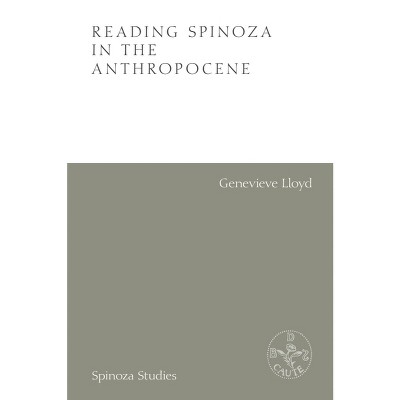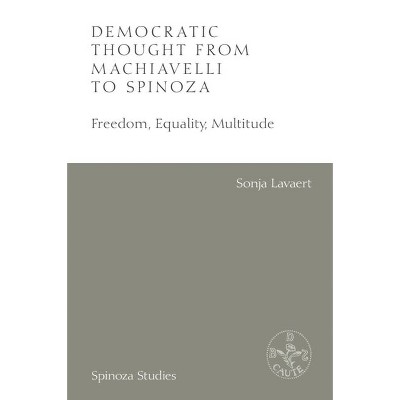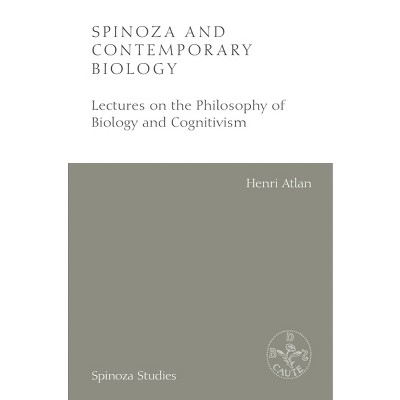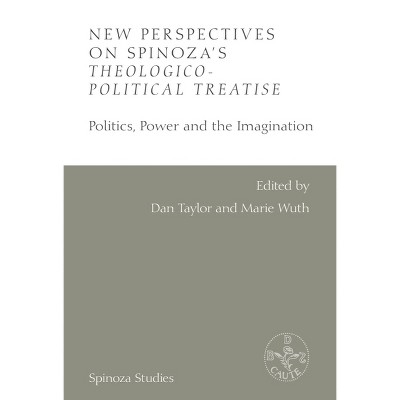Spinoza's Political Philosophy - (Spinoza Studies) by Riccardo Caporali (Paperback)

About this item
Highlights
- Riccardo Caporali examines of all of Spinoza's works while addressing the challenges imposed by the historical circumstances at the time.
- About the Author: Riccardo Caporali is Professor of Moral Philosophy at the University of Bologna, Italy.
- 240 Pages
- Philosophy, Individual Philosophers
- Series Name: Spinoza Studies
Description
About the Book
Riccardo Caporali examines of all of Spinoza's works while addressing the challenges imposed by the historical circumstances at the time. Focusing on Spinoza's constant preoccupation with the relationship between metaphysics and politics, Caporali shows that it takes different forms in his various major works.
Book Synopsis
Riccardo Caporali examines of all of Spinoza's works while addressing the challenges imposed by the historical circumstances at the time. Spinoza's work and its author - the philosopher and the man - go hand in hand. Focusing on Spinoza's constant preoccupation with the relationship between metaphysics and politics, Caporali shows that it takes different forms in his various major works. He highlights specific moments of this discontinuity, particularly in the transition between the Tractatus Theologico-Politicus and the Tractatus Politicus. And he weaves in comparisons and references to Machiavelli, Descartes, Hobbes, Locke, Vico and Hegel, and to many contemporary interpretations of Spinoza's thought.
From the Back Cover
'Through an accurate analysis of Spinoza's work, from Part I of Ethics to the last line of the Political Treatise, Caporali displays the political thought of the author in all its depth and novelty. Rarely, if ever, has such a controversial topic been presented with this much clarity and coherence.' Diogo Pires Aurélio, New University of Lisbon A reconstruction of Spinoza's political philosophy Riccardo Caporali makes a close and circular connection between metaphysics, ethics and politics in Spinoza's thought. He offers an examination of all of Spinoza's works while addressing the challenges imposed by the historical circumstances at the time. As a result, Spinoza's work and its author, the philosopher and the man, go hand in hand. Focusing on Spinoza's constant preoccupation with the relationship between metaphysics and politics, Caporali shows that it takes different forms in his various major works. He highlights specific moments of this discontinuity, particularly in the transition between the Tractatus Theologico-Politicus and the Tractatus Politicus. Caporali's reconstruction of Spinoza's political philosophy, alongside the historical context and events, is interwoven with comparisons and references to Machiavelli, Descartes, Hobbes, Locke, Vico and Hegel, as well as to many contemporary interpretations of Spinoza's thought. Riccardo Caporali is Professor of Moral Philosophy at the University of Bologna, Italy. Fabio Gironi is an independent researcher and translator. Cover design: www.richardbudddesign.co.uk [EUP logo] edinburghuniversitypress.com ISBN 978-1-4744-6759-9 BarcodeReview Quotes
[...] its panoramic quality, strengths in close reading, fluency in the history of ideas and elegant style will interest scholars working across early modern political thought. [...] translations like this are making accessible a world of continental studies in Spinoza that should greatly enrich forward-looking research.
--Dan Taylor "History of Political Thought"Through an accurate analysis of Spinoza's work, from Part I of Ethics to the last line of the Political Treatise, Caporali displays the political thought of the author in all its depth and novelty. Rarely, if ever, has such a controversial topic been presented with this much clarity and coherence.
-- "Diogo Pires Aurélio, New University of Lisbon"Developing an interpretation of Baruch Spinoza's political thought, Caporali surveys the Theological-Political Treatise and the unfinished Political Treatise, but roots his analysis in the metaphysics of Spinoza's masterwork, the Ethics. Caporali begins with the concept of causa sui (cause of itself), which frames God's causal power not as will or authority but as the generative unity of substance. Summing Up: Recommended. Graduate students, researchers, faculty.--D. A. Forbes "CHOICE"
About the Author
Riccardo Caporali is Professor of Moral Philosophy at the University of Bologna, Italy. He is the author of Il netto e il sospetto: a proposito di Machiavelli (Cesena, 2014), La pazienza degli esclusi. Studi su Spinoza (Mimesis, 2012), Uguaglianza (il Mulino, 2012), La tenerezza e la barbarie. Studi su Vico (Liguori, 2006), La fabbrica dell'imperium. Saggio su Spinoza (Liguori, 2000) and Heroes gentium. Sapienza e politica in Vico (il Mulino, 1992). This is his first book to be translated into English.
Fabio Gironi is an independent researcher. He is the author of Analytic and Continental Kantianism: The Legacy of Kant in Sellars and Meillassoux (Routledge, 2017) and Naturalizing Badiou: Mathematical Ontology and Structural Realism (Palgrave Macmillan, 2015). He is the translator of Becoming Animal: Philosophy of Animality After Deleuze by Felice Cimatti (EUP, 2020).
Shipping details
Return details
Trending Poetry











